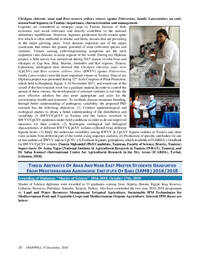Chickpea chlorotic stunt and Beet western yellows viruses (genus Polerovirus, family Luteoviridae) on cool season food legumes in Tunisia: importance, characterization and management

Authors:
Legumes are considered as strategic crops in Tunisia because of their economic and social relevance and directly contribute in the national alimentary equilibrium. However, legumes production levels remain quite low which is often attributed to abiotic and biotic stresses that are prevailing in the major growing areas. Viral diseases represent one of the major constraints that reduce the genetic potential of most cultivated species and varieties. Viruses causing yellowing/stunting symptoms are the most important virus diseases in many regions of the world. During my Diploma project, a field survey was carried out during 2015 season on faba bean and chickpea in Cap bon, Béja, Bizerte, Jendouba and Kef regions, Tunisia. Laboratory serological tests showed that Chickpea chlorotic stunt virus (CpCSV) and Beet western yellows virus (BWYV) (genus Polerovirus, family Luteoviridae) were the most important viruses in Tunisia. Data of my Diploma project was presented during 12th Arab Congress of Plant Protection, which held in Hurghada, Egypt, 4-10 November 2017, and wined one of the award of the best research work for a graduate student.
In order to control the spread of these viruses, the development of resistant varieties is not only the most effective solution but also more appropriate and safer for the environment, health and economic. To facilitate disease resistance breeding, through better understanding of pathogenic variability, the proposed PhD research has the following objectives: (1) Conduct epidemiological and ecological studies to obtain a better understanding of the distribution and variability of BWYV/CpCSV in Tunisia and the factors involved in BWYV/CpCSV epidemics under field conditions in order to devise improved measures for their control; (2) Investigate serological and biological characteristics of different BWYV/CpCSV isolates collected from different legume hosts; (3) Study the molecular variability among BWYV & CpCSV legume isolates in Tunisia and other virus isolates from different part of the world, using sequence analysis; (4) Production of specific antibodies for one or two isolates of BWYV and/or CpCSV; (5) Evaluate legumes germplasm, which available at ICARDA’s GenBank for BWYV/CpCSV isolates.
Samia Mghandef (PhD Candidate, Tunisian, Faculty of Science, Bizerte, Tunisia); Supervisors: Dr Asma Najar [National Institute of Agricultural Research in Tunisia (INRAT), Tunisia], and Dr Safaa Kumari (International Centre for Agricultural Research in the Dry Areas (ICARDA), Terbol, Lebanon].
